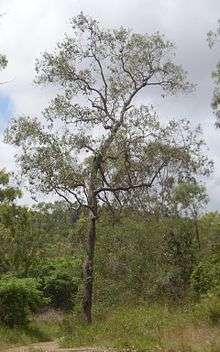Lophostemon
| Lophostemon | |
|---|---|
 | |
| Lophostemon confertus | |
| Scientific classification | |
| Kingdom: | Plantae |
| (unranked): | Angiosperms |
| (unranked): | Eudicots |
| (unranked): | Rosids |
| Order: | Myrtales |
| Family: | Myrtaceae |
| Genus: | Lophostemon Schott |

Lophostemon ('lophos' - crest, 'stemon' - stamen) is a genus of 4 species of evergreen tree in the myrtle family Myrtaceae. All four species are native to Australia, with one extending to New Guinea.[1] The genus was first described in 1830[2][3] but not widely recognized until the 1980s. All 4 species were previously included in the related genus Tristania.[4][5]
The most well-known species, L. confertus is a familiar tree to many people living along the east coast of Australia, where it known colloquially as the brush box. Quite frequently, it has been planted as a street tree, a role it isn't suited for as it grows to 30 metres in height and quite often suffers lopping due to obstructing overhead power lines.
Lophostemon species are used as food plants by the larvae of some Lepidoptera species including Aenetus ligniveren.
- Species[1]
- Lophostemon confertus (R.Br.) Peter G.Wilson & J.T.Waterh. - (Brush Box, Queensland Box, Brisbane Box) Queensland, New South Wales
- Lophostemon grandiflorus (Benth.) Peter G.Wilson & J.T.Waterh. - (Northern Swamp Box) Queensland, Northern Territory, Western Australia
- Lophostemon lactifluus (F.Muell.) Peter G.Wilson & J.T.Waterh. - (Milky Box) Northern Territory, Western Australia
- Lophostemon suaveolens (Sol. ex Gaertn.) Peter G.Wilson & J.T.Waterh. - (Swamp Mahogany, Swamp Turpentine, Swamp Box) Queensland, New South Wales, New Guinea
References
- 1 2 Kew World Checklist of Selected Plant Families
- ↑ Schott, Heinrich Wilhelm. 1830. Wiener Zeitschrift für Kunst, Litteratur, Theater und Mode 1830(3): 772
- ↑ Tropicos, Lophostemon Schott
- ↑ Wilson, Peter Gordon & Waterhouse, John Teast. 1982. Australian Journal of Botany 30(4): 424-430
- ↑ Centre for Plant Biodiversity Research, Australian Government, Canberra. "Lophostemon". Australian Plant Name Index (APNI), IBIS database. Retrieved 2007-10-05.